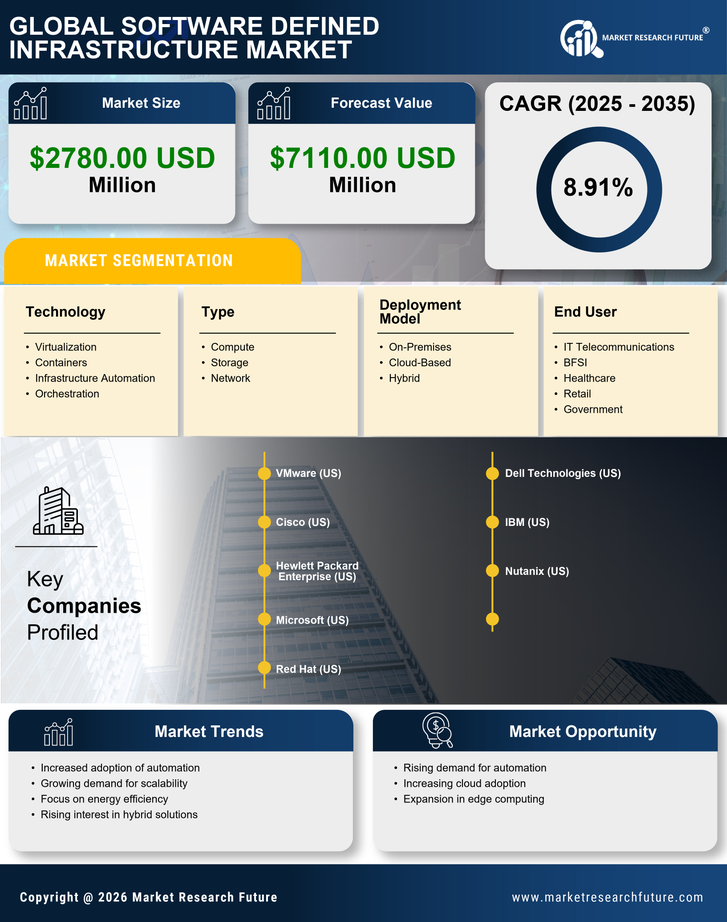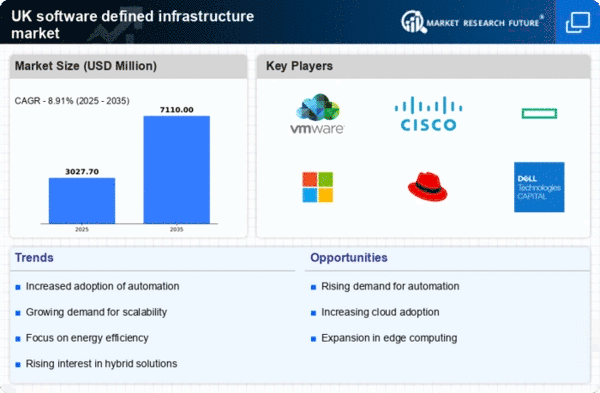Enhanced Security Protocols
Security remains a paramount concern for organizations operating within the software defined-infrastructure market. In the UK, the increasing frequency of cyber threats has prompted businesses to prioritize robust security measures. Software defined-infrastructure solutions offer advanced security features, such as automated threat detection and response capabilities, which are essential for safeguarding sensitive data. The market is witnessing a surge in demand for integrated security solutions that can adapt to evolving threats. According to recent data, approximately 60% of UK firms are investing in enhanced security protocols as part of their infrastructure strategy. This focus on security is expected to drive further adoption of software defined-infrastructure technologies, as organizations seek to protect their assets and maintain compliance with regulatory requirements.
Shift Towards Edge Computing
The software defined-infrastructure market is being significantly influenced by the shift towards edge computing, particularly in the UK. As businesses seek to process data closer to its source, the demand for infrastructure that supports edge computing is on the rise. This trend is driven by the need for low-latency processing and real-time analytics, which are critical for applications such as IoT and autonomous systems. It is estimated that by 2026, the edge computing market in the UK could reach £4 billion, significantly impacting the software defined-infrastructure landscape. Consequently, organizations are investing in software defined solutions that facilitate seamless integration between edge devices and central data centers, thereby enhancing operational efficiency and responsiveness.
Growing Need for Cost Efficiency
The software defined-infrastructure market is experiencing a notable shift towards cost efficiency as organizations seek to optimize their IT expenditures. In the UK, businesses are increasingly adopting software defined-infrastructure solutions to reduce operational costs associated with traditional hardware. This trend is driven by the need to allocate resources more effectively, with estimates suggesting that companies can save up to 30% on infrastructure costs by transitioning to software defined models. Furthermore, the ability to scale resources dynamically allows organizations to avoid over-provisioning, thereby enhancing financial performance. As a result, the demand for cost-effective solutions is likely to propel growth in the software defined-infrastructure market, as firms strive to maintain competitive advantages in a challenging economic landscape.
Integration of Artificial Intelligence
The integration of artificial intelligence (AI) into the software defined-infrastructure market is becoming a transformative driver. In the UK, organizations are increasingly leveraging AI to enhance operational efficiency and decision-making processes. AI technologies enable predictive analytics, automated resource allocation, and intelligent monitoring, which are essential for optimizing infrastructure performance. Recent studies indicate that approximately 45% of UK businesses are exploring AI-driven solutions to improve their infrastructure management. This trend suggests that the software defined-infrastructure market will continue to evolve, as companies seek to harness the power of AI to streamline operations and reduce downtime, ultimately leading to improved service delivery and customer satisfaction.
Regulatory Compliance and Data Sovereignty
In the software defined-infrastructure market, regulatory compliance and data sovereignty are becoming increasingly critical for UK organizations. With stringent data protection regulations, such as the GDPR, businesses are compelled to ensure that their infrastructure complies with legal requirements. This has led to a growing demand for software defined solutions that provide transparency and control over data management. Companies are seeking infrastructure that allows them to maintain data within specific geographical boundaries, thereby mitigating risks associated with data breaches. As a result, the software defined-infrastructure market is likely to see heightened investment in compliance-focused technologies, as organizations strive to align their operations with regulatory standards while optimizing their infrastructure.

















